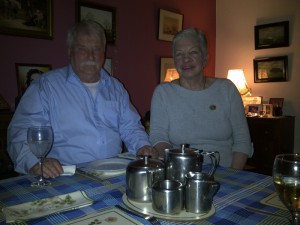This weekend saw two festivities: St Patrick’s Day and Mothers Day. So – after a quick sobering raw egg on Sunday morning, I adopted the personna of the dutiful (and truly grateful) daughter in the morning to see my mother and then switched to “matriarchal” mindset for my family’s visit in the afternoon.
I know my mother enjoys us all sharing good childhood memories with her i.e. “I always appreciated how hard you worked and how you always kept the house nice despite the huge number of us clambering about “. She does not indulge memories such as “I didn’t break that window and you wouldn’t believe me…..” the precise petty injustices that we adults often remember for longer than we should.
Childhood memories are powerful, magnified – good and bad. Things were probably never as good as we thought they were and often, for some lucky ones, never quite as bad as we thought they were. This weekend’s family visits reminded me that we never truly know exactly how we influence children while they are growing up around us – our own children, our nieces and nephews and indeed any child we come across.
Children can remember “dismissive looks” and “sideway glances”as much, if not more, than they remember words. I can still say I don’t like Mrs W from primary school because she rolled her eyes once when I was telling another teacher about a fall. As a child, I interpreted that look as “I don’t believe her”.
Equally, my fondest memory of primary school is the Wednesday visit from Miss McCloughlan, the Reading Teacher – I remember two things most vividly – her mauve hat and her tender look when she would see me. Tender looks were not common in schools in the ’60s and it saw me through from week to week.
The conversations this weekend were about this very subject: the positive influences we can have on children without even knowing it. While visiting an Aunt and Uncle, they reminisced about me as a child and I told them how I loved visiting their house in the East End of London at age 5 and how I learnt my love of radio in their house and how the sight of Uncle Jimmy pottering about, not especially attentive but not tired of us either, brought a feeling of continuity and comfort. I haven’t seen that house for 50 years but I was able to describe each step and the view from the window in detail. I told them of my favourite memory of their “modern” stainless steel tea set and how “posh” it all seemed sitting down for tea with them as a child. That tea set was a real visual memory for me. My aunt left the room and remerged holding a tea set on a tray “is that the tea set?” I asked with reverence as if it was from the Ming Dynasty – “the very one” my Aunt assured me.
They delighted in my delight as I described in detail, being called into the dining room (I come from a huge family with little room for a cup on your lap so staying in their house with a “dining room” was the epitome of “posh” to me then) and this tea set, with its separate jug for hot water, the sugar bowl brimming with as much sugar as you cared to spoon, the whiteness of the milk in the jug – to a 5 year old was a joy.
Uncle Jimmy was bemused that his green cardigan with the duffle-coat buttons was part of my memory parcel.  He was bewildered that I was able to recall little things he would do that added to the well-being building blocks that play a part in creating happy children. My Aunt tutted when I recalled how strict she was – it took me 50 years to understand that her way was strict but her actions were well-meaning – pitching in to help my parents when we were young.
He was bewildered that I was able to recall little things he would do that added to the well-being building blocks that play a part in creating happy children. My Aunt tutted when I recalled how strict she was – it took me 50 years to understand that her way was strict but her actions were well-meaning – pitching in to help my parents when we were young.
This tea set, and Uncle Jimmy’s green cardigan have reminded me to be especially aware when I am around grandchildren, nieces and nephews to catch them doing something right, make sure my face demonstrates that I am not exhausted by them and it has motivated me to bring some special ornament out when they come to tea. I would very much like to end up in someone’s blog 20 years down the road with a photo of my special ornament and knowing that I played a part in the building of well-being blocks for as many children as I possibly can.
Eileen Murphy
Twitter: @EileenHMurphy
Email: info@brief-therapy-uk.com
www.brief-therapy-uk.com

Leave a Reply